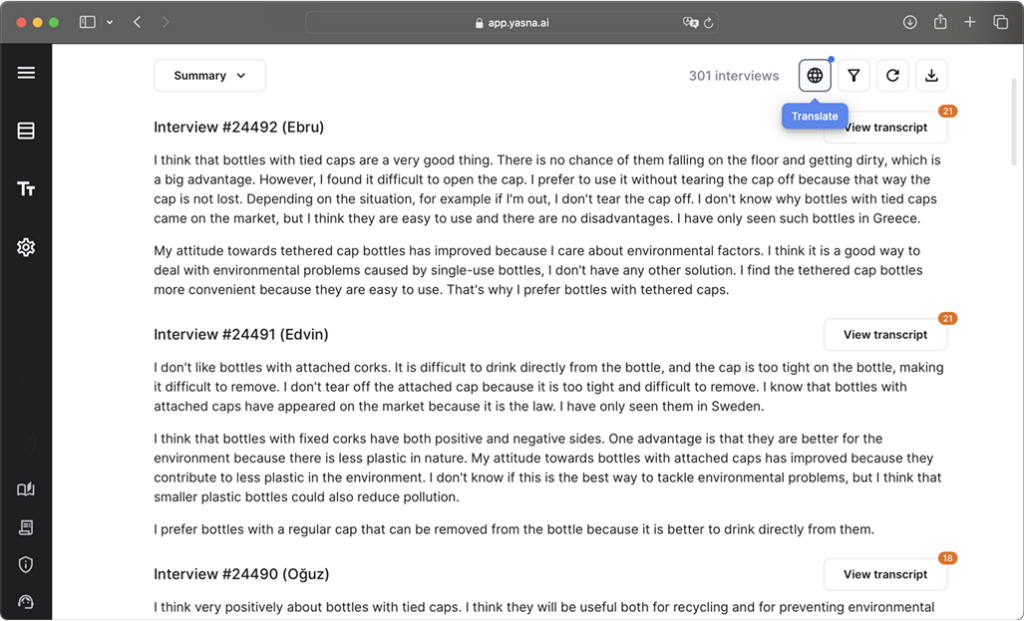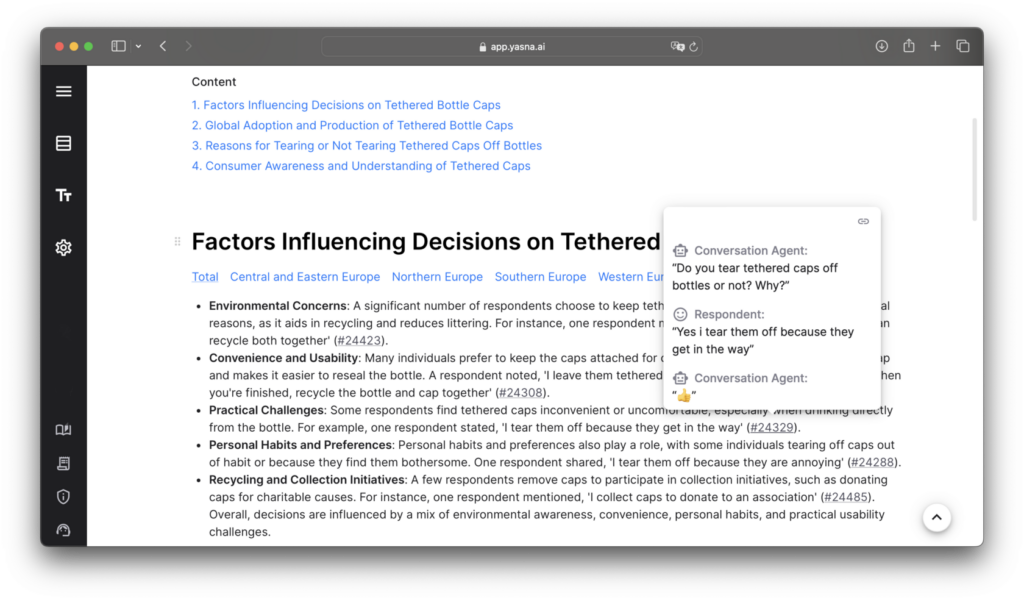Eco-friendly Bottles with Attached Caps
Love or Hate?
Our AI assistant Yasna talked to 300 men and women across 13 countries in Europe: Poland, Romania, Czech Republic, Sweden, Finland, Norway, Greece, Italy, Spain, Netherlands, Germany, France, United Kingdom.
It took Yasna 2 days to conduct all interviews and process the data. Plus a couple of minutes to generate a comprehensive report with numerical validation.

Automated In-Depth Interviews vs. Classic Research Methods
WORKSHOP: Learn about benefits, limitations and applications of AI-powered interviews
Learn more
Over 50% of Europeans prefer detachable caps. But there’s an attitude split between North and South.
Top highlights from the yasna.ai report:
-
Poland was most annoyed.
76% of the respondents understand the environmental cause behind the updated design, but 52% tear the caps off anyway.
This behaviour is mainly caused by difficulties in using bottles
with attached caps, which may be due to a lower quality
of plastic in Poland.

-
Spain was least annoyed.
80% actually prefer bottles with tethered caps! In fact, Southern Europe in general felt better about the new design AFTER they learned about the motivation behind it — easier recycling of caps together with bottles.

-
The UK was mildly annoyed, but most accepting anyway.
75% prefer tethered caps even though 39% reported that these caps get in the way, and 45% find them irritating while drinking. Waste reduction was the top reason why people supported the initiative despite the discomfort it caused.

-
In the North, recycling in general is already the norm.
Recycling of bottle caps in particular is nothing new either. And so, explaining the purpose of attached caps made little difference for the majority of participants. This initiative didn’t strike them as a new or a better way to benefit the environment.

-
A lack of clear communication can be blamed for the low level of acceptance of the new design across 13 countries.
People were just not ready.
These caps are here for a good cause. However, the road paved with good intentions can still lead to consumer hell…especially if the caps scratch people, lead to spills and so on. Also! The rules of communication aren’t just for traditional marketing. As Yasna has shown us, clear messaging behind unpopular initiatives can do wonders for perception.

What’s inside the report? For every project, Yasna creates dialogue summaries:

These are an easy way to dive deeper into the stories, while still enjoying a fast reading experience.
In the example above we’ve already translated two summaries that were originally in Greek and Swedish into English (which took a second thanks to a built-in translator).
Love to see the numbers? Yasna has a scaling feature for that.

In this section you get to dive into the numerical data that validates qualitative findings from the previous section of the report.
In our case, there is a noticeable discrepancy between the stats in the Northern and Southern European countries. For instance: no one in the North thinks it’s a good idea to ban single-use plastic, while 18% in the South are all for it.
Yasna provides customizable conclusions based on the data from the interviews:

This part of the report provides a thorough understanding of the research results.
Each conclusion is supported by illustrative quotes like the one highlighted in orange. Each quote is linked to its source interview, so it’s easy to jump to the full dialogues.
For multi-language studies, there is a handy built-in one-click translation feature. For example, today’s bottle cap exploration was performed in 13 languages. The interviews that were originally conducted in Norwegian, Spanish, Polish and so on can be instantly translated into English right inside the platform.

